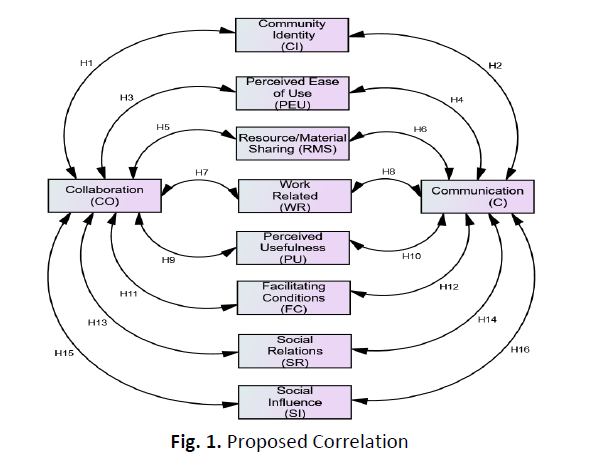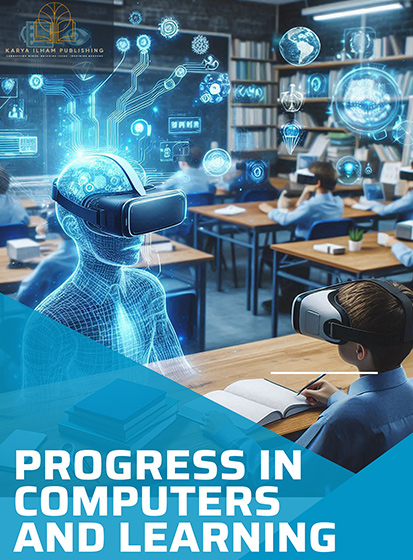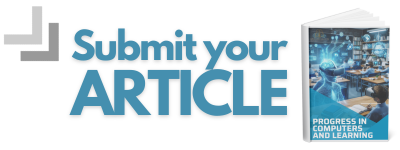Facebook Group as Platform to Support Online Learning during the COVID-19 Endemic
DOI:
https://doi.org/10.37934/picl.2.1.4960Keywords:
Facebook, online learning, online discussion, COVID-19, communicationAbstract
COVID-19 forces the educational sector to be implemented via online. However, students faced problems to have a good platform for their online learning. Facebook is one of the platforms used for informal learning. Numerous studies have explored the features in the Facebook learning environment but lacked studies on the correlation between the features in the Facebook learning environment towards collaboration and communication. Therefore, this study assesses the correlation between features on Facebook and learning. Thus, this study aims to examine correlation for each feature in Facebook toward communication and collaboration as a discussion platform for student learning. A survey was carried out on 50 undergraduate students in a Malaysian university. The data were collected through a questionnaire adapted from previous study. The descriptive analysis and AMOS regression path analysis were used in this study. The result revealed that perceived ease of use, research material sharing, work related, and facilitating conditions have a significant correlation with collaboration. Moreover, research materials sharing, perceived usefulness, facilitating conditions, and social relations have a significant correlation with communication. Thus, it can be concluded that Facebook groups could support online learning during the COVID-19 endemic. Some limitations and future suggestions were also discussed in this study
Downloads
References
[1] Luik, Piret, and Marina Lepp. "Changes in activity and content of messages of an Estonian Facebook group during transition to distance learning at the beginning of the COVID‐19 pandemic." Journal of Computer Assisted Learning 37, no. 6 (2021): 1629-1639. https://doi.org/10.1111/jcal.12602 DOI: https://doi.org/10.1111/jcal.12602
[2] Giannikas, Christina. "Facebook in tertiary education: The impact of social media in e-Learning." Journal of university teaching & learning practice 17, no. 1 (2020): 3. https://doi.org/10.53761/1.17.1.3 DOI: https://doi.org/10.53761/1.17.1.3
[3] Manca, Stefania. "Snapping, pinning, liking or texting: Investigating social media in higher education beyond Facebook." The Internet and Higher Education 44 (2020): 100707. https://doi.org/10.1016/j.iheduc.2019.100707 DOI: https://doi.org/10.1016/j.iheduc.2019.100707
[4] Sinn, Donghee, and Sue Yeon Syn. "Personal documentation on a social network site: Facebook, a collection of moments from your life?." Archival Science 14 (2014): 95-124. https://doi.org/10.1007/s10502-013-9208-7 DOI: https://doi.org/10.1007/s10502-013-9208-7
[5] Amir, Shajnush, Mirza Sarwar Kamal, MD Tanzil Shahria, and Lamia Iftekhar. "Facebook’s social learning group for undergraduate engineering courses: A case study of emergency remote teaching amid large digital divide." In 2020 IEEE International Conference on Teaching, Assessment, and Learning for Engineering (TALE), pp. 235-242. IEEE, 2020. https://doi.org/10.1109/TALE48869.2020.9368316 DOI: https://doi.org/10.1109/TALE48869.2020.9368316
[6] Zarzycka, Ewelina, Joanna Krasodomska, Anna Mazurczak-Mąka, and Monika Turek-Radwan. "Distance learning during the COVID-19 pandemic: students’ communication and collaboration and the role of social media." Cogent Arts & Humanities 8, no. 1 (2021): 1953228. https://doi.org/10.1080/23311983.2021.1953228 DOI: https://doi.org/10.1080/23311983.2021.1953228
[7] Boholano, Helen B., and Roberto Cajes. "The Utilization of Facebook During Covid-19 Pandemic by First-Year College Students." International Journal of Social Learning (IJSL) 1, no. 2 (2021): 163-173. https://doi.org/10.47134/ijsl.v1i2.52 DOI: https://doi.org/10.47134/ijsl.v1i2.52
[8] Ulla, Mark B., and William F. Perales. "Facebook as an integrated online learning support application during the COVID19 pandemic: Thai university students’ experiences and perspectives." Heliyon 7, no. 11 (2021): e08317. https://doi.org/10.1016/j.heliyon.2021.e08317 DOI: https://doi.org/10.1016/j.heliyon.2021.e08317
[9] Alwreikat, Asma, Mohammed Khair Abu Zaid, and Ahmed Shehata. "Determinants of Facebook use among students and its impact on collaborative learning." Information Development 38, no. 4 (2022): 641-657. https://doi.org/10.1177/02666669211005819
[10] Felten, Peter. "From pandemic to endemic pedagogy: Being CLEAR in our teaching." New Directions for Teaching and Learning 2022, no. 169 (2022): 39-46. https://doi.org/10.1002/tl.20481 DOI: https://doi.org/10.1002/tl.20481
[11] Rowe, Francisco, Alessia Calafiore, Daniel Arribas-Bel, Krasen Samardzhiev, and Martin Fleischmann. "Urban exodus? Understanding human mobility in Britain during the COVID-19 pandemic using Facebook data." arXiv preprint arXiv:2206.03272 (2022). https://doi.org/10.31219/osf.io/6hjv3 DOI: https://doi.org/10.31219/osf.io/6hjv3
[12] Padmaja, C., and B. L. Malleswari. "Forecasting of COVID-19 Using Hybrid ARIMA-FB Prophet Algorithm." In ICT with Intelligent Applications: Proceedings of ICTIS 2021, Volume 1, pp. 603-611. Springer Singapore, 2022. https://doi.org/10.1007/978-981-16-4177-0_59 DOI: https://doi.org/10.1007/978-981-16-4177-0_59
[13] Avila, Ernie C., and Honorato I. Cabrera Jr. "The use of Facebook group in distance learning during the time of COVID-19 Pandemic." PalArch's Journal of Archaeology of Egypt/Egyptology 17, no. 6 (2020): 1859-1871
[14] Al Qunayeer, Huda Suleiman. "Exploring EFL learners’ online participation in online peer writing discussions through a Facebook group." Journal of Information Technology Education: Research 19 (2020): 671-692. https://doi.org/10.28945/4621 DOI: https://doi.org/10.28945/4621
[15] Mykytiuk, Svitlana, Olena Lysytska, and Tetiana Melnikova. "Facebook Group as an Educational Platform for Foreign Language Acquisition." Postmodern Openings/Deschideri Postmoderne 11 (2020). https://doi.org/10.18662/po/11.1sup1/127 DOI: https://doi.org/10.18662/po/11.1sup1/127
[16] Che Lah, Noor Hidayah, Zaidatun Tasir, and Nurul Farhana Jumaat. "An Evaluation of the Online Social Learning Environment Instrument (OSLEI) Using Rasch Model Analysis." SAGE Open 12, no. 2 (2022): 21582440221104083. https://doi.org/10.1177/21582440221104083 DOI: https://doi.org/10.1177/21582440221104083
[17] Lah, Noor Hidayah Che, and Zaidatun Tasir. "Measuring reliability and validity of questionnaire on online social presence: a Rasch model analysis." Advanced Science Letters 24, no. 11 (2018): 7900-7903. https://doi.org/10.1166/asl.2018.12452 DOI: https://doi.org/10.1166/asl.2018.12452
[18] Bailey, D. R., and N. M. Almusharraf. "Facebook in class: The instructor’s influence on engagement and language play in online social media forums." Computer Assisted Language Learning–Electronic Journal 22, no. 3 (2021): 66-85.
[19] Alwreikat, Asma, Mohammed Khair Abu Zaid, and Ahmed Shehata. "Determinants of Facebook use among students and its impact on collaborative learning." Information Development 38, no. 4 (2022): 641-657. https://doi.org/10.1177/02666669211005819
[20] Alhabash, Saleem, Hyojung Park, Anastasia Kononova, Yi-hsuan Chiang, and Kevin Wise. "Exploring the motivations of Facebook use in Taiwan." Cyberpsychology, behavior, and social networking 15, no. 6 (2012): 304-311. https://doi.org/10.1089/cyber.2011.0611 DOI: https://doi.org/10.1089/cyber.2011.0611
[21] Zhang, Xiaochen Angela. "What constitutes great IDEA? An examination of corporate diversity communication on facebook and external and internal stakeholder reactions." Public Relations Review 48, no. 5 (2022): 102254. https://doi.org/10.1016/j.pubrev.2022.102254 DOI: https://doi.org/10.1016/j.pubrev.2022.102254
[22] Sánchez, R. Arteaga, Virginia Cortijo, and Uzma Javed. "Students' perceptions of Facebook for academic purposes." Computers & Education 70 (2014): 138-149. https://doi.org/10.1016/j.compedu.2013.08.012 DOI: https://doi.org/10.1016/j.compedu.2013.08.012
[23] Davis, Fred D. "Perceived usefulness, perceived ease of use, and user acceptance of information technology." MIS quarterly (1989): 319-340. https://doi.org/10.2307/249008 DOI: https://doi.org/10.2307/249008
[24] Venkatesh, Viswanath, Michael G. Morris, Gordon B. Davis, and Fred D. Davis. "User acceptance of information technology: Toward a unified view." MIS quarterly (2003): 425-478. https://doi.org/10.2307/30036540 DOI: https://doi.org/10.2307/30036540
[25] Venkatesh, Viswanath, Susan A. Brown, Likoebe M. Maruping, and Hillol Bala. "Predicting different conceptualizations of system use: The competing roles of behavioral intention, facilitating conditions, and behavioral expectation." MIS quarterly (2008): 483-502. https://doi.org/10.2307/25148853 DOI: https://doi.org/10.2307/25148853
[26] Mazman, Sacide Güzin, and Yasemin Koçak Usluel. "Modeling educational usage of Facebook." Computers & Education 55, no. 2 (2010): 444-453. https://doi.org/10.1016/j.compedu.2010.02.008 DOI: https://doi.org/10.1016/j.compedu.2010.02.008
[27] Walsh, John P., and Nancy G. Maloney. "Collaboration structure, communication media, and problems in scientific work teams." Journal of computer-mediated communication 12, no. 2 (2007): 712-732. https://doi.org/10.1111/j.1083-6101.2007.00346.x DOI: https://doi.org/10.1111/j.1083-6101.2007.00346.x
[28] Zhu, Chang. "Student satisfaction, performance, and knowledge construction in online collaborative learning." Journal of Educational Technology & Society 15, no. 1 (2012): 127-136.
[29] Mazer, Joseph P. "Student emotional and cognitive interest as mediators of teacher communication behaviors and student engagement: An examination of direct and interaction effects." Communication Education 62, no. 3 (2013): 253-277. https://doi.org/10.1080/03634523.2013.777752 DOI: https://doi.org/10.1080/03634523.2013.777752
[30] Gandhi, Inderpreet, and A. Hyde. "Organizational commitment in nationalized banks." Pacific Business Review International 6, no. 5 (2013): 58-68.
[31] Awang, Zainudin. Research methodology and data analysis second edition. UiTM Press, 2012.
[32] Elkaseh, Ali Mohamed, Kok Wai Wong, and Chun Che Fung. "Perceived ease of use and perceived usefulness of social media for e-learning in Libyan higher education: A structural equation modeling analysis." International Journal of Information and Education Technology 6, no. 3 (2016): 192. https://doi.org/10.7763/IJIET.2016.V6.683 DOI: https://doi.org/10.7763/IJIET.2016.V6.683
[33] Puspitasari, Febriyanti Ismi, Santirianingrum Soebandhi, Denny Hamzah Subagyo, and Aryo Nugroho. "Altruism and Egoism in e-WOM: The moderating effect of Facebook perceived ease of use." In 2019 International Seminar on Application for Technology of Information and Communication (iSemantic), pp. 536-541. IEEE, 2019. https://doi.org/10.1109/ISEMANTIC.2019.8884276 DOI: https://doi.org/10.1109/ISEMANTIC.2019.8884276
[34] Al-Rahmi, Waleed Mugahed, and Akram M. Zeki. "A model of using social media for collaborative learning to enhance learners’ performance on learning." Journal of King Saud University-Computer and Information Sciences 29, no. 4 (2017): 526-535. https://doi.org/10.1016/j.jksuci.2016.09.002 DOI: https://doi.org/10.1016/j.jksuci.2016.09.002
[35] Alwreikat, Asma, Mohammed Khair Abu Zaid, and Ahmed Shehata. "Determinants of Facebook use among students and its impact on collaborative learning." Information Development 38, no. 4 (2022): 641-657. https://doi.org/10.1177/02666669211005819 DOI: https://doi.org/10.1177/02666669211005819
[36] Novia, Daniela. "The potential of Facebook Groups as a learning tool: The case of an English-language community of practice." (2022).
[37] Leung, Tin Nok, Yin Ming Hui, Canon KL Luk, Dickson KW Chiu, and Kevin KW Ho. "Evaluating Facebook as aids for learning Japanese: learners' perspectives." Library Hi Tech ahead-of-print (2022). https://doi.org/10.1108/LHT-11-2021-0400 DOI: https://doi.org/10.1108/LHT-11-2021-0400
[38] Wongsa, Manit, and Jeong-Bae Son. "Enhancing Thai secondary school students’ English speaking skills, attitudes and motivation with drama-based activities and Facebook." Innovation in Language Learning and Teaching 16, no. 1 (2022): 41-52. https://doi.org/10.1080/17501229.2020.1853134 DOI: https://doi.org/10.1080/17501229.2020.1853134
[39] Hoi, Vo Ngoc, and Ho Le Hang. "Student engagement in the facebook learning environment: a person-centred study." Journal of Educational Computing Research 60, no. 1 (2022): 170-195. https://doi.org/10.1177/07356331211030158 DOI: https://doi.org/10.1177/07356331211030158
[40] Che Lah, Noor Hidayah, Zaidatun Tasir, and Nurul Farhana Jumaat. "Applying alternative method to evaluate online problem-solving skill inventory (OPSI) using Rasch model analysis." Educational Studies (2021): 1-23. https://doi.org/10.1080/03055698.2021.1874310 DOI: https://doi.org/10.1080/03055698.2021.1874310
[41] Lin, Peng-Chun, Huei-Tse Hou, and Kuo-En Chang. "The development of a collaborative problem solving environment that integrates a scaffolding mind tool and simulation-based learning: an analysis of learners’ performance and their cognitive process in discussion." Interactive Learning Environments 30, no. 7 (2022): 1273-1290. https://doi.org/10.1080/10494820.2020.1719163 DOI: https://doi.org/10.1080/10494820.2020.1719163
[42] Shodiyev, Muxiddin Berdimuradovich. "The usage of web technologies as social network (Facebook) in teaching a foreign language to adults." Science and Education 3, no. 2 (2022): 973-977.
[43] Hamadi, Mostafa, Jamal El-Den, Sami Azam, and Narumon Sriratanaviriyakul. "Integrating social media as cooperative learning tool in higher education classrooms: An empirical study." Journal of King Saud University-Computer and Information Sciences 34, no. 6 (2022): 3722-3731. https://doi.org/10.1016/j.jksuci.2020.12.007 DOI: https://doi.org/10.1016/j.jksuci.2020.12.007
[44] Allam, Hesham, Vish Akre, James Blustein, Sandra Toze, and Faisal Kalota. "Factors Affecting People's Adoption of Facebook: A UAE Case Study." In 2022 8th International Conference on Information Technology Trends (ITT), pp. 34-38. IEEE, 2022. https://doi.org/10.1109/ITT56123.2022.9863947 DOI: https://doi.org/10.1109/ITT56123.2022.9863947
[45] Duong, Quynh PT, and Thinh N. Pham. "Moving beyond four walls and forming a learning community for speaking practice under the auspices of Facebook." E-Learning and Digital Media 19, no. 1 (2022): 1-18. https://doi.org/10.1177/20427530211028067 DOI: https://doi.org/10.1177/20427530211028067
[46] Yousef, Suzan, and Khalil Yousef. "The impact of Facebook usage in education on students’ academic performance at the University of Jordan." Journal of e-Learning and Knowledge Society 18, no. 1 (2022): 59-74.
[47] KILIÇ, Servet. "Effectiveness of Gamification on the Community of Inquiry Development in Online Project-based Programming Courses Conducted on Facebook." Informatics in Education (2022). https://doi.org/10.15388/infedu.2023.04 DOI: https://doi.org/10.15388/infedu.2023.04
[48] Lin, Ming-Fang, Yuan-shan Chen, and Yu-Ting Lai. "Promoting the sustainable development of rural EFL learners’ email literacy through a Facebook Project." Sustainability 14, no. 10 (2022): 6209. https://doi.org/10.3390/su14106209 DOI: https://doi.org/10.3390/su14106209
[49] Chen, Hsuan-Chu, Chun-Chia Wang, Jason C. Hung, and Cheng-Yu Hsueh. "Employing Eye Tracking to Study Visual Attention to Live Streaming: A Case Study of Facebook Live." Sustainability 14, no. 12 (2022): 7494. https://doi.org/10.3390/su14127494 DOI: https://doi.org/10.3390/su14127494















